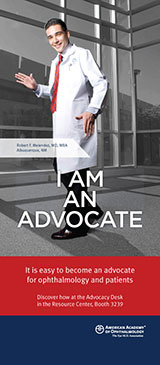 During my senior year in college, I was admitted to optometry school. Before I confirmed my acceptance, my dean suggested that I spend a day with two ophthalmologists. His advice changed my life.
During my senior year in college, I was admitted to optometry school. Before I confirmed my acceptance, my dean suggested that I spend a day with two ophthalmologists. His advice changed my life.
One ophthalmologist I shadowed that day had been an optometrist himself for nearly 10 years. When I asked about his career change, he said he felt that practicing as an optometrist limited him and didn’t allow him to treat patients completely. So he left his practice and went to medical school to become an ophthalmologist. His example was part of what helped me decide to turn down optometry school and apply to medical school to pursue a career in ophthalmology.
During my residency at the University of Texas, San Antonio, I got involved in an advocacy program. I’d been involved in school politics through high school and college, so advocacy just felt like a natural first step in my volunteering efforts for ophthalmology. I guess I’ve always had a need to discover what I can do to help others and to make a situation better.
Because of my involvement with the UT advocacy program, I learned about a group that was going to the Academy’s Congressional Advocacy Day and Mid-Year Forum in Washington, D.C. I applied to go and was fortunately one of the residents chosen to attend in the pilot effort now known as the Advocacy Ambassador’s Program.
I have attended the Mid-Year Forum since 2004 and I always get goose bumps when I walk the halls of Congress. It is that one time of year when ophthalmologists are given face-to-face time with their legislators in D.C. It is also an opportunity to build relationships with legislative assistants. I’ve learned that these relationships result in stronger associations with the legislators themselves. Through my involvement, I was asked by one of the legislators to sit on his health care advisory board.
It is important to expose others to advocacy as well. I have taken all three of my children to Congressional Advocacy Day. This has given them personal insight as to how we communicate with our legislators. The legislators in turn enjoyed the relaxed atmosphere that my children brought. How many children can say they have a personal photo with their legislator!
After my residency I moved back to New Mexico and joined the state ophthalmology society. I set a goal to become an officer in the state society. I took action to achieve that goal, and not long after I was elected secretary/treasurer of the New Mexico Academy of Ophthalmology. I now sit on the executive committee and was appointed educational chair.
Around the same time, I was nominated to participate in the Academy’s Leadership Development Program. Involvement in this program had the biggest impact on me as a young professional. Participation in this program created new opportunities for me.
Just as I've been affected by the various leaders I've met and the opportunities I’ve had, I believe we also have a responsibility to inform, educate and mentor the next generation. I encourage you to share your advocacy and leadership experiences with tomorrow’s leaders.
To the young ophthalmologists, the best piece of advice I can give is to get involved, locally and at the state and federal level. Find the one area where you can make an improvement — the area you feel passionately about — and make your mark there.
Robert F. Melendez, MD, MBA, is a comprehensive ophthalmologist and partner at Eye Associates of New Mexico, and a clinical assistant professor at the University of New Mexico Health Sciences Center.